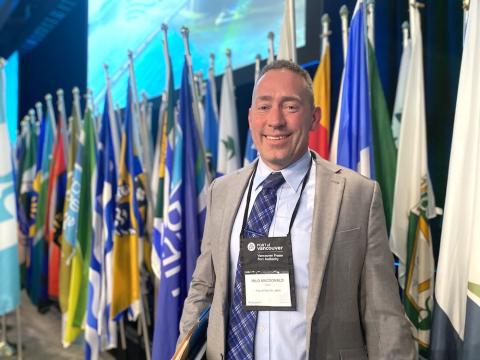Across BC, local governments are taking action to maintain public safety and address mental health and addiction issues. Every year the UBCM Convention plenary session delves into an issue being faced by all local governments, rural, urban and in between. This year the focus is the complex intersection of the toxic drug crisis, public use concerns and the impacts on communities, and their police, fire departments, and other local first responders. UBCM spent 5 minutes with one panelist, the CAO of Fort St. John Milo MacDonald to learn more.
UBCM: We've been talking a lot about the intersection of the toxic drug crisis and public use concerns across BC. How is this showing up in Fort St. John?
Milo MacDonald, Chief Administrative Officer for Fort St. John: We're seeing a substantially increased community of homeless people who are also drug addicted throughout the city. Because of the nature of their addictions, they’ve been unable to comply with the conditions required within our shelter. That becomes quite a significant cause for concern by the public – the tents and garbage and things.
We've faced a lot of pressure as a local government to deal with that, even though it's not really the responsibility of local government to meet those needs. But it’s the public's expectation, and we're the only level of government that'll answer that call.
In addition, there has been a substantial increase in overdose deaths. All of our first responders are dealing with an increase in fatal overdoses and an increase in overdoses that require treatment. That's pretty that's pretty tough on those folks, and the obvious impact to grieving families, has been a horrific implication as well.
UBCM: How has the decriminalization policy, including the amendments, impacted Fort St. John?
MacDonald: It just isn't working. We’re not Portugal – we haven't got the supports in place to be able to make this effective. This whole process was put in place without any commitment to provide treatment and detox and the kinds of supports that made the Portugal model a little bit more successful. The only aspect of the policy that seems to have mattered to the folks who implemented it here was decriminalization itself. If you're in active addiction and you get to a place where you're willing to quit, or you're looking for help, there's just nothing. There's nothing to support you.
The walk-back on decriminalization appears to have been largely a communications exercise rather than operational instruction. Nothing has changed on the ground, for sure. There's no appetite for drug possession charges.
UBCM: Public discussion about decriminalization can make it sound like the needs of drug users and folks struggling with addiction are at odds with the goals of public safety. What have you learned in Fort St John about how to balance the needs of different parts of the community?
MacDonald: Well, you know, I'm not sure. That is the subject of the debate: Where do you establish a balance point between the disparate goals and rights of those two groups? I think part of what created stability before was the enforcement from police.
There’s a perspective in the provincial government that addiction is a medical problem that doesn’t require any police assistance, which I see as very short-sighted. I was a policeman for 20 years, undercover for 10 years, and from my perspective, the purpose of street level drug enforcement was not to criminalize addiction: its purpose was to reduce the incidents of homicides and violent crime. But that type of enforcement doesn't take place at anywhere near the same level, and there’s been an increase in the number of shootings, homicides and violent crime because we're simply not managing the drug trade.
I think that there's been a failure [among policy makers] to recognize that this is a multi-jurisdictional, multi-disciplinary problem that requires a multi-jurisdictional, multi-disciplinary response. Removal of a support always results in a collapse.
We operate in an environment that is so complex that not one single participant understands all of the implications of the policies they're proposing. What's required is humility and cautiousness, and an approach to evaluate the results relative to our goals at regular intervals and make course corrections if required. That's the only way you can get anywhere in public policy.
UBCM: Recognizing that not all of this is within local government jurisdiction, what approaches has Fort St. John tried that have showed positive results?
MacDonald: We have tried really hard to create an environment where people are not under threat. We hired a Manager of Public Safety, who was previously a social worker in the shelter, so she already had relationships with a lot of the people who are homeless.
We’ve tried to find sites where people in tents can have a little bit of privacy, and still be close enough to services. We put dumpsters and outhouses where that was appropriate, and we interact on a regular basis. If there's an event planned in a park, we'll have a conversation to say, ‘Come Sunday, this might not be the best place to be’. We've managed to do that in a conversational way, rather than leaning on enforcement.
We're also working to reduce the amount of acrimony and anger that's directed towards them by reducing their impact on the pubic. We really feel like that anger is a major public safety issue. You could characterize the acrimony as coming from people who aren't sympathetic or compassionate, but it's more coming from people who have stepped in human fecal material, or who found needles in playgrounds, or have seen thousands of dollars of stolen property in these encampments, and experienced a police response unwilling to take that on.

